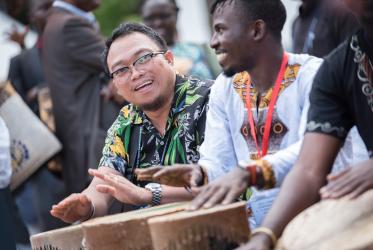By Christina Biere*
Nearly one hundred representatives of the German member churches of the World Council of Churches (WCC) met from 16 to 18 January at the Evangelical Academy of Loccum in order to share their experiences from the WCC 10th Assembly and to discuss how they would continue their way together on their pilgrimage of justice and peace.
"All of the more than 10,000 Koreans who were present, either as stewards, students, day visitors or participants in the visitation programme, have 'gotten a taste' of the ecumenical atmosphere of the assembly. This will have a lasting impact on their Christian life, their appreciation of other confessions and their awareness of the ecumenical movement", said Dong-Sung Kim, WCC secretary for the Asian region.
Many of the German participants were especially moved by reports from Korean conscientious objectors who had been jailed because of the Christian witness of peace. "Here, with our experience in achieving the right to conscientious objection, we have a responsibility in the ecumenical dialogue," said Renke Brahms, spokesperson for peace issues of the Evangelical Church in Germany (EKD).
"In Korea, again and again we were asked about the reunification of Germany and what Christians could do towards it," one participant reported.
Konrad Raiser, former WCC general secretary, used Europe as an illustration: "In Germany, churches had no planned, ready-made process for reunification. In the ecumenical community, we can learn far more from the unification process in Europe and the efforts towards democratization that have been made there."
Dong-Sung Kim also emphasized that the question of unity and just political self-determination in Korea was not a national, but rather a regional issue; it was a possible theme for a future dialogue between European and East Asian churches.
"If we take a look at the political realities of our age, we see that international ecumenical church fellowships such as the Conference of European Churches (CEC) and WCC are more important now than ever," said EKD bishop for foreign affairs Petra Bosse-Huber, who, in Busan, was elected to the WCC's Central and Executive committees. "I would like to dedicate myself to making these instruments of ecumenical cooperation stronger."
For Bosse-Huber, European cooperation also has a particularly important role to play here: "We must strive more energetically to bring themes that are of importance to us as European churches into the public arena." Calling into question unjust economic structures, right-wing populism and the "fortress Europe," along with the injustice that the European Union's external borders signify for refugees, were several examples cited by Bosse-Huber.
The pilgrim path: moving forward together
Participants at the Loccum gathering repeatedly asked what implications the pilgrimage had for ecumenical action from a methodological point of view. "The pilgrimage expresses the understanding of ecumenism as a process," said Dr Martin Robra, WCC programme director for the study of ecumenism in the 21st century.
"It describes the ecumenical quest for unity as the sum of many small steps along one road," said Martin Hein, Bishop of the Evangelical Church of Kurhessen-Waldeck. "The ecumenical pilgrimage needs the involvement of the marginalized people in our society. They must be the ones who show us the way," insisted Fernando Enns, professor of peace theology in Hamburg and Amsterdam.
Along the pilgrim way, there are sources of strength as well as places of pain. "We must identify spiritual places in our traditions that can give us "living water" and, thus strengthened, confront the places of pain in our societies and learn from the experiences there," said Heike Bosien, organizer of the gathering. This depiction of learning by empathy as an element of a spirituality of just peace received an enthusiastic applause.
It is with this in mind that the ecumenical network MEET (More Ecumenical Empowerment Together) is planning a pilgrimage in the autumn of 2014 that will lead young adults of diverse confessions to "stations" related to the themes of flight and migration. "We want to meet men and women who tell us about their experiences as migrants in Germany and, if possible, travel part of the way with us," said co-initiator Charlotte Eisenberg.
The ecumenical study group in the Global Ecumenical Theological Institute (GETI) remains in the minds of many participants as an example worth following. "When I look at GETI participants, I know: Ecumenical education can be exciting!" said Bishop Bosse. "Ecumenical education should be high up on our agenda."
Participants also had enthusiastic recollections of the Peace Train. "The Peace Train was a three-week journey from Berlin to Busan. It was a pilgrimage that changed me," said Daniel Jung, a German pastor of Korean origin. "If it hadn't been for the encounters with fellow travellers, for their hope of crossing North Korea and their pain when this was not possible, I would never have understood what the division of Korea still meant to people today."
*Christina Biere is pastor of the Evangelical Church of Westphalia; from 2006 to 2013, member of the WCC Central Committee.
Website of the 10th Assembly of the World Council of Churches:
http://wcc2013.info/en










